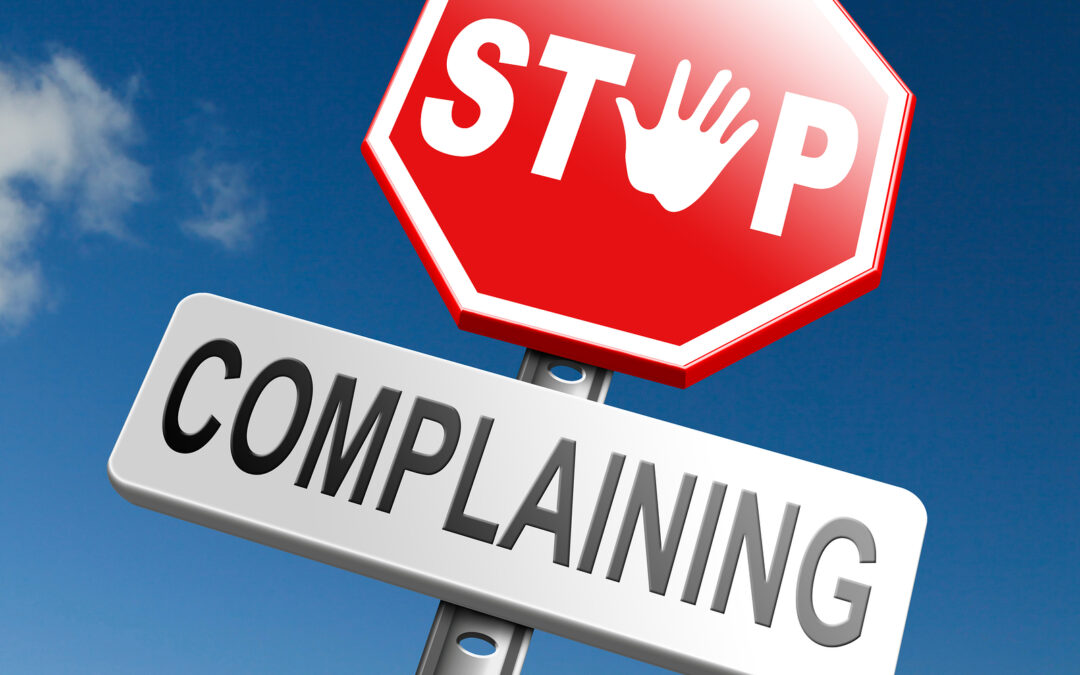The Power of Purposeful Complaining to Create a More Inspiring Workplace
What’s one of the biggest morale-suckers in any workplace?
A survey by executive coach Marshall Goldsmith aligns with other research that sadly suggests that most employees spend 10 hours or more per month complaining about their managers or listening to other employees complain. And that doesn’t even include the time spent complaining about peers or customers! Not only is this cacophony of cranky complaining a productivity sucker, it’s also a soul-sucking, fun-sucking energy zapper!
Research shows that chronic complaining has detrimental physiological effects. Chronic complaining can cause our neurotransmitters to rewire, making it easier for unhappy thoughts to repeat themselves. Even more worrisome, constant complaining can damage the hippocampus – the part of our brain used for cognitive reasoning and problem solving (and not, as I once thought, a place where hippopotamuses go for higher education). Finally, complaining is highly contagious – one workplace “seagull” crapping all over everyone can quickly infect an entire workplace flock.
Why not make it a goal for the year: Challenge yourself, family members, and teammates to complain less? Try the old rubber band trick – tie a band to your wrist and snap it every time you complain as a reminder. Hold a week long “de-complain-athon” and challenge your teammates to keep track of the number of times they complain and award a prize to the person who complains the least (and give yourself a prize the first time someone complains that people will cheat).
Create Get Out of Complaint Jail Free vouchers that let’s everyone off the hook for a one-time only complaint to rein in repetitive complainers. Add a “whine and cheese” section to your meetings where people have the chance to sound off in playfully exaggerated ways, with the promise that everyone has to bottle the whine afterwards. Or put up fun reminder signs: You are Now Entering a Complaint-Free Zone!
When people start to complain, try shifting the conversation to be more gratitude focused. Or, create a policy like Netflix uses to stop complaining in its tracks: If someone complains about someone at Netflix behind their back, the person on the receiving end stops the conversation and tells the complainer they need to speak directly to that person.
And finally, encourage the concept of “purposeful complaining” as opposed to time-draining complaining. Complaining solves nothing. But purposeful complaining (and maybe we need a better term here?), where we channel frustrations into concrete actions can help us turn seagulls into soaring eagles. (I know, that’s soooo bad.)
As always, I’d welcome your thoughts, questions, and ideas! How do you minimize the level of complaining in your workplace? Does the concept of “purposeful complaining” resonate with you?
 Michael Kerr is a Canadian Hall of Fame speaker, trainer, and author of 8 books, Michael travels the world researching, writing, and speaking about inspiring workplace cultures and businesses that leverage their humor resources to create outrageous results! His books include “The Jerk-Free Workplace: How You Can Take the Lead to Create a Happier, More Inspiring Workplace,” “Hire, Inspire, and Fuel Their Fire: How to Recruit, Onboard, and Train new Employees to Live Your Culture Out Loud,” and “The Humor Advantage: Why Some Businesses Are Laughing all the Way to the Bank.”
Michael Kerr is a Canadian Hall of Fame speaker, trainer, and author of 8 books, Michael travels the world researching, writing, and speaking about inspiring workplace cultures and businesses that leverage their humor resources to create outrageous results! His books include “The Jerk-Free Workplace: How You Can Take the Lead to Create a Happier, More Inspiring Workplace,” “Hire, Inspire, and Fuel Their Fire: How to Recruit, Onboard, and Train new Employees to Live Your Culture Out Loud,” and “The Humor Advantage: Why Some Businesses Are Laughing all the Way to the Bank.”





